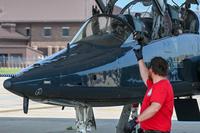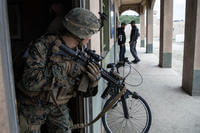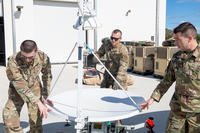Hybrid vehicles are coming to a military motor pool near you, write Paul McLeary and Kimberly Johnson in AvWeek, but it'll be awhile before they actually make their way onto a battlefield. The military stands to save billions of dollars by operating fleets that get better fuel economy, but first it has to overcome deep skepticism about tomorrow's more complicated vehicles, they write. The first step will be operating hybrids in non-tactical fleets -- rolling around at home or inside the wire -- and then, theoretically, someday armored vehicles could operate with dual-power engines, or fuel cells, or other kinds of alternate technology.
Per Paul and Kim:
While the need to reduce the military’s fuel consumption has never been greater due to rising fuel prices and the budget crunch the Pentagon is facing, the path forward for acquisitions is littered with new technology slow to tempt the old guard. The mindset of the military regarding fuel efficiency is different than on the commercial side, says Mike Mekhiche, BAE Systems director of parallel drive systems. “There are cultural hurdles that need to be overcome.”
There are both benefits and drawbacks, they continue:
Significantly, for a ground force that increasingly relies on small electronics like night-vision equipment, handheld radios, biometric systems and metal detectors to sniff out buried roadside bombs, hybrid trucks carry their own generators and can export power. The ability to export power, makers say, creates a huge draw for hybrid technology, which is considered a force multiplier by being capable of generating enough power to run a forward operating base for 2-3 days.Still, the image of the Army’s fleet of tactical vehicles running hybrid engines on the battlefield anytime soon might need to be put on hold, says Paul Skalny, director of the Army’s Tank Automotive Research, Development and Engineering Center’s (Tardec) National Automotive Center. “The fielding of hybrids will be in the non-tactical world” first, he says. “A fuel-cell hybrid in a tactical situation is something that may happen, but quite some time from now. You may see a fuel cell auxiliary power unit (APU) in a vehicle [but] it will be some time [before it is fielded on a battlefield], because we have issues” with exposing an APU to battlefield dirt, which “would kill an APU.”
So even in tomorrow's high-tech, green force, it appears the Army and Marines will still have plenty of uses for old-fashioned internal combustion engines.








